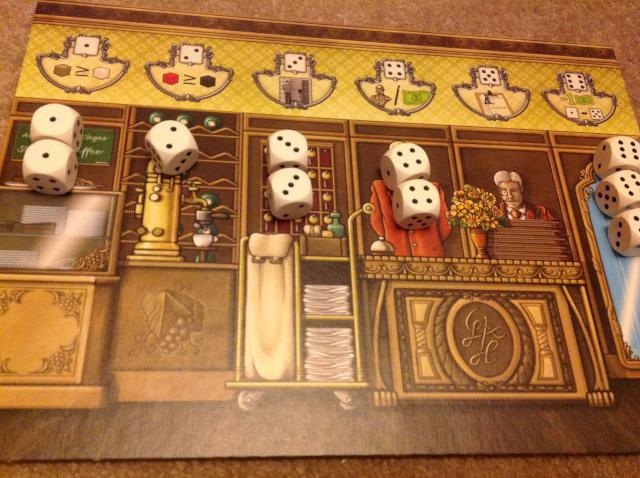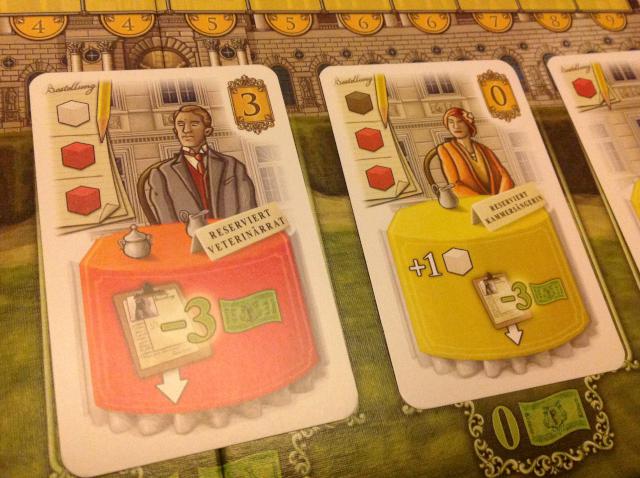
Games which revolve around creating and managing a hotel are more commonly found on mobiles than tabletops nowadays, but that doesn’t mean it’s where they ought to be. Grand Austria Hotel is a new board game from Mayfair Games which not only gives a great experience for you and some friends, but also wipes the floor with most of the electronic equivalents trying to keep you interested through nothing more than endless notifications.
The idea of putting together a hotel fits a board game far better than you might think, and while Grand Austria Hotel has a lot of things to think about and resources to manage, it’s all surprisingly easy to learn. This is partly down to the beautifully illustrated and easy to follow rule book, which takes you carefully through each step and occasionally suggests ways to make things a bit more straightforward for new players in terms of which hotel layouts to use and selecting certain staff cards.
Played over 7 rounds, the idea is to bring customers into your café, fill them with cake, strudel, wine and coffee until you have a room and the relevant finances available for them to go to their freshly prepared temporary home. Each customer has specific requirements to fulfil in terms of their café order, and they’ll sit at a table filling up that space until you’ve managed to shift them into the hotel itself by completing their food and drink orders. Alongside this you’ve also got victory points to keep track of, as well as an Emperor track which can help provide those all important victory points at certain times of the game. With the key to victory being (surprisingly) getting as many victory points as possible you’ll be looking for as many ways as possible to pick them up, whether that’s filling rooms, employing helpful staff or fulfilling some political challenges.
At the start of a round, once the dice have been rolled (there will be 10, 12 or 14 depending on the number of players) they’re sorted and placed into a specific area on the action board (shown below). It’s these dice which form the basis of each player’s move during the round. Any areas which have dice in them can be used, with the number of dice dictating just how useful that action is. Looking at the example below, the section containing those dice which landed on 3 allows the player to prepare a room in their hotel; the more dice in there are, the more rooms they can prepare. With this player choosing to prepare two rooms (as two of the dice landed on a 3), they take one of those dice off the board, instantly making it slightly less useful for the next player. Each action has its own uses such as giving you more food or drink to use, increasing your money supply and so on. Choosing the right action will entirely depend on your current situation – there’s no point having 10 rooms freshly prepared but no food or drink to serve to your waiting customers!

The order of play is interesting though. Instead of taking it in turns as you normally would expect to, play bounces back in the other direction once the final player has had their first turn. With four players that means whoever goes 4th also goes 5th, with the player who started the round (and therefore had first choice of the actions available) takes their turn after everyone else has had two picks of the dice. It’s a nice dynamic for games with smaller players, but does mean a bit of waiting around if you go first in that round. The opening players changes in each round so it’ll always be someone different going first (and last) but with little to think about while you’re waiting for your turns to come back round it can feel a little long winded. It’s not terrible, and with good company it’s unlikely you’ll even notice time passing, but if you’re going for a full player setup it’s something to bear in mind.
At the end of rounds three, five and seven the Emperor track is brought into play. Depending on which round you’ve just finished, everyone moves down a certain number of spaces on the track, leaving you in the black, silver or gold zone. Cards which were randomly selected at the start of the game then come into play, with those still in the gold section being rewarded and anyone in the black area being punished, often with devastating effect. It means you can’t ignore that side of the game, and even if you’re focussing on filling as many rooms as possible you’ll need to keep half an eye on your Emperor points in the run up to each of these crucial moments.

Eventually you’ll reach the end, finish off the final few cards which are activated when everything else is done and dusted, run through a few other rewards and end up with your winner. It can be a bit of a surprise who ends up winning once all of the final considerations are made, and the final Emperor round can take your finely crafted strategy and give it a pretty sizeable kick in the nuts if you’re not careful, but there’s enough strategy involved here to stop anyone feeling cheated. More often than not those who win are the ones which have coupled a bit of dice-based luck with some forward thinking and clever use of staff cards, political challenges and their customers. There are several ways to try and win and lots of point-earning methods to consider, and the option of mixing up the hotels, adding more staff cards and totally randomising the Emperor cards means no two games will be the same, and no single strategy will ever be guaranteed success.
So as you’ve probably worked out, I really enjoyed Grand Austria Hotel. It was easy enough to learn that myself and my family were able to enjoy it, but also rewarded a bit of practice and the chance to try out some different ideas and strategies. This comes very highly recommended by us at TGR, and is definitely one to keep an eye out for in your nearest games shop.
Grand Austria Hotel
Available Now, RRP £47.99
Find your local stockist here

Leave a Reply